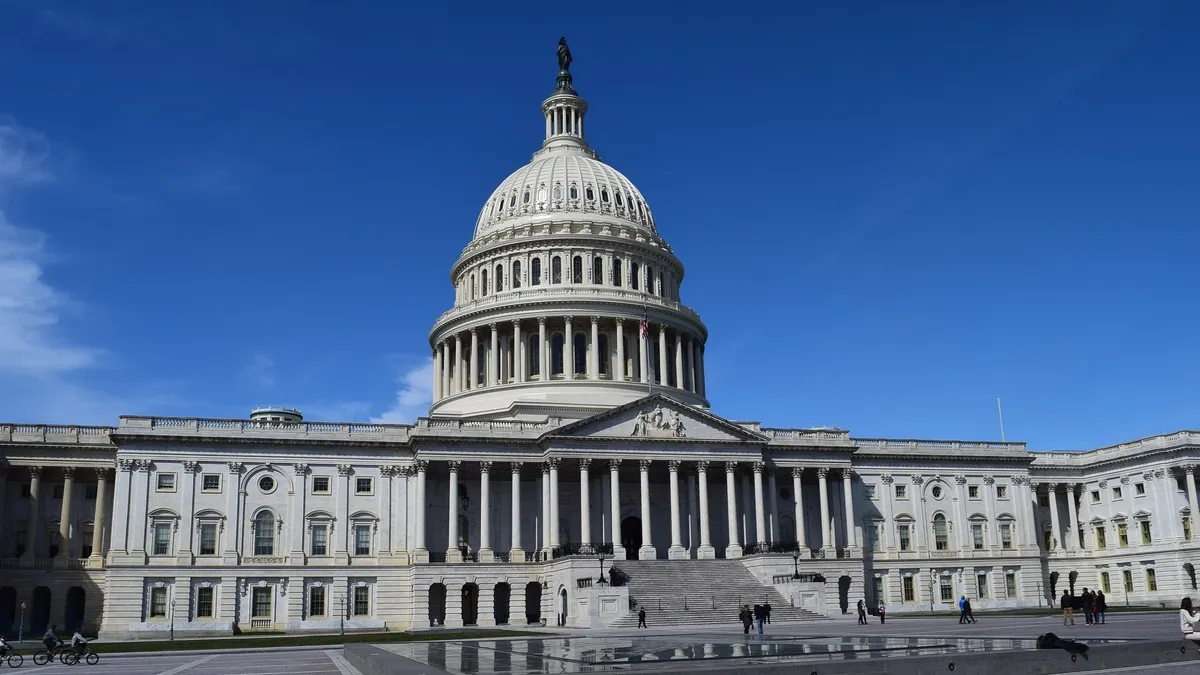UPDATE: April 24, 2020: President Donald Trump signed the latest coronavirus relief package on Friday, a day after the House passed the $484 billion bill by a vote of 388 to 5.
Dive Brief:
- Hospitals are set to get $75 billion in the next round of emergency funding for the country's COVID-19 response as the Senate approved legislation Tuesday and the White House expressed support. The House of Representatives could return for a vote as soon as this week.
- The amount is three-quarters of what various hospital groups had requested as their facilities face a major financial hit from the pandemic. Most have stopped lucrative elective procedures at the same time expenses rise due to increased need for staff and specialty supplies to treat the virus. Still, hospitals commended the legislation, saying it would "help ensure that critical care can continue to be provided by frontline providers throughout the country."
- The amended Paycheck Protection Program and Health Care Enhancement Act allocates another $25 billion for expanding and administering COVID-19 testing for active infection and prior exposure as well as conducting surveillance and contact tracing.
Dive Insight:
Labs appear to have fared better in the latest current funding round with $25 billion earmarked for testing in some way. Pleas for $5 billion to be set aside for testing in the earlier effort did not prove successful.
The $25 billion is directed "to prevent, prepare for, and respond to coronavirus, domestically or internationally, for necessary expenses to research, develop, validate, manufacture, purchase, administer, and expand capacity for COVID–19 tests," including testing equipment and supplies for for validation of rapid, molecular point-of-care, serology and antigen tests, according to the Congressional record.
The American Clinical Laboratory Association, representing LabCorp and Quest Diagnostics among others, praised the move as an "important step." Still, it asked for more clarity in how the funds would be distributed.
"ACLA urges HHS to quickly provide clarity on how the funding will be allocated to support hotspots and high-risk populations, as well as broader efforts to increase high throughput testing nationwide. Continued support and funding for high throughput testing from commercial, hospital and academic laboratories is essential to achieve both of these goals," the group said in a statement.
Major hospital operators HCA Healthcare, Community Health Systems and Tenet Healthcare have all pulled their 2020 guidance as they adjust for the influx of COVID-19 patients across the country.
In its first quarter report Tuesday, HCA attributed a steep decrease in volumes and 45% drop in profit to the pandemic. "We do believe the impact to the company will be most pronounced during this current response phase, as volume continues to decline throughout April," HCA CFO Bill Rutherford told investors Tuesday.
Hospitals received $100 billion in the $2.2 trillion Coronavirus Aid, Relief, and Economic Security Act passed last month and the first tranche of that funding has already been deposited in facilities' bank accounts, based on historic Medicare payments.
The second round will be targeted to reach providers in hot spots and those not included previously, CMS has said. The agency has declined to give further details or an update on timing, however.
The American Hospital Association said in a statement the CARES funds "are already being used by hospitals and health systems to increase capacity and provide care, and in some cases to keep access to care available by keeping the doors open."
And while the agency touted the funding as "no strings attached," terms and conditions subsequently put out have given some providers pause.
CMS has made other attempts to help hospitals financially. The CARES Act includes a 20% bump to payments for treating COVID-19 and the agency has sent billions in expedited Medicare payments as hospitals request them.
Hospitals warned Tuesday that HHS should distribute funds quickly. "While we appreciate Congress taking swift action — more still needs to be done to defeat COVID," the Federation of American Hospitals said in a statement. "It is important that HHS distributes the funding in a timely, well-targeted fashion. And it remains mission-critical to reform the Medicare Accelerated Payment Program so that it does not impede hospitals' ability to meet patient needs."












